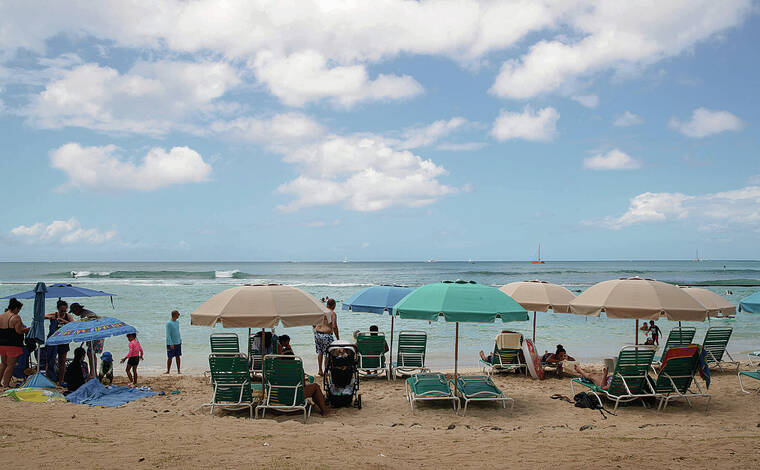
Mahalo for supporting Honolulu Star-Advertiser. Enjoy this free story!
A new crime reduction program called “Safe and Sound Waikiki” kicked off Tuesday in Waikiki, where the community has been demanding an official response to a rash of high-profile violent crimes.
Honolulu Prosecuting Attorney Steve Alm was joined by Honolulu Mayor Rick Blangiardi and Honolulu Police Chief Joe Logan to announce the program at a news conference held in front of Kuhio Beach Pavilion No. 4, where mounting crime and increased homelessness in Waikiki recently prompted a nonprofit to pull out of the site.
“Safe and Sound Waikiki is all about working together with all of the good folks here in Waikiki,” Alm said. “First, to make Waikiki safe by reducing crime, and to make Waikiki sound by making it as healthy and strong as possible.”
Alm, who is aiming to make good on an election campaign promise by delivering the program to Waikiki, said the multiagency effort is based on the “Weed and Seed” program, which is established in other parts of Oahu. However, Alm said the Waikiki program has separate autonomy and funding: about $250,000 from city coffers and another $90,000 from the Paul Kosasa Foundation.
Extending beyond the Honolulu Police Department’s Waikiki district, the boundaries for Safe and Sound Waikiki run from the Ala Wai Small Boat Harbor along the coast to Diamond Head Road and connect with Ala Wai Boulevard. It also includes Diamond Head State Monument, the Honolulu Zoo and Kapiolani Park.
A steering committee led by Jennifer Nakayama, who serves as the Waikiki Business Improvement District Association’s president and executive director, is tasked with hiring a site coordinator who will bring together various law enforcement agencies, the Judiciary, the community and social service providers like Waikiki Health, the Health &Harm Reduction Center, Adult Friends for Youth and the Institute for Human Services.
Alm said based on the results from other Oahu Weed and Seed programs, organizers know that services for homeless people as well as those contending with mental health and addiction challenges will be important. The Department of the Prosecuting Attorney plans to expand its “Substance Use Disorder Assessment-Fast,” or SUDA-Fast, program into Waikiki. The program works to get people with substance abuse problems quickly assessed and into treatment before they are sentenced to probation.
The launch of the Waikiki crime prevention and mitigation program comes as that community is still smarting from recent incidents such as one on Aug. 7 in which police were called to Kuhio Beach in the late afternoon to investigate a report of a person carrying a handgun. That incident, which terrified some beachgoers and others, followed a July 22 sword attack, in which a man’s hand was cut off at the Kalakaua Avenue 7-Eleven.
In April the community was rattled by several violent late-night attacks. In one instance a military veteran and his girlfriend were brutally beaten by a group of young people as the couple exited a Waikiki bar. In another a 24-year-old visitor from Tacoma, Wash., reported that he had been attacked so viciously that he was hospitalized for two days and treated for fractures to his skull, spine, back, ribs and hands.
Jessica Lani Rich, president and CEO of the Visitor Aloha Society of Hawaii, noted that the program is starting about 15 months after the stabbing death of a 19-year-old Waikiki visitor at Kuhio Beach. On Friday an Oahu jury found Oscar Cardona, 23, guilty of one count of second-degree murder in connection with the stabbing, which occurred in early June 2021.
“When a visitor gets murdered or assaulted or robbed or is a victim of theft or some other crime, it’s not only the victim that suffers — an entire community suffers,” Rich said. “Prevention is important.”
Echoing that point was Mufi Hannemann, the Hawaii Lodging &Tourism Association’s president and CEO. Hannemann, who played a key role in bringing the program to the tourism-focused area, said Waikiki crimes have broad impacts on residents, workers, community patrons, visitors and the destination itself.
“The crime that occurs in Waikiki gets magnified 100-fold. If we don’t do a better job of controlling crime in these two square miles, visitors will think that Hawaii in general is not a safe destination — and that (safety) has always been one of our competitive advantages over other destinations,” he said. “Having managed our way through the pandemic fairly well, today I’d like to say we are a healthy place to come and visit, and we are a safe place to come and enjoy.”
Kosasa, president and CEO of ABC Stores, which have a significant presence in Waikiki, said he recently came back from a business trip to Las Vegas where there were armed guards in stores. Kosasa said he wants to keep Waikiki crime from reaching that level, and hopes the program can benefit other neighborhoods. “If the model works in Waikiki, we can expand it to other communities,” he said.
Blangiardi pledged his support for the program and to help spruce up Waikiki, including Pavilion No. 4, and nearby eyesores such as a broken water fountain and a pay phone covered in graffiti. “We are joined in this endeavor. (Waikiki) is not a forgotten place,” he said.
Waikiki residents said they want the city to promptly fill the pavilion because loitering there and in other closed areas in the beach park creates havoc.
Ian Scheuring, Blangiardi’s spokesperson, told the Honolulu Star-Advertiser last week that the city is negotiating to fill Kuhio Beach Pavilion No. 4 at least temporarily with the bikesharing program Biki.
Logan said Safe and Sound Waikiki has the Honolulu Police Department’s full cooperation. Though the program won’t produce an immediate increase in HPD personnel, Logan said if the Waikiki District commander says additional forces are needed, “it’s my job to provide that support.”
To meet its full potential, Alm has said the program needs the cooperation of the Judiciary as well as city and state leaders. Local government may be tapped to fund hundreds more residential treatment beds.
Honolulu Council Chair Tommy Waters said $5 million has been placed in the city budget to provide grants to, among other things, address inpatient services tied to substance abuse and/or mental health issues.
Also, $1 million was added to expand stabilization facilities in partnership with HPD and the state Department of Health that create a transition for severely mentally ill people and those with substance abuse issues to become stable and get into longer-term care, he said.
Additionally, Waters said he wants to work with the Prosecutor’s Office and courts to see that more of those convicted of misdemeanors are placed on probation. Alm said probation generally needs to be stricter and that judges should agree to ban more probationers from returning to where they committed the crime.
Read More: World News | Entertainment News | Celeb News
Star Ads






